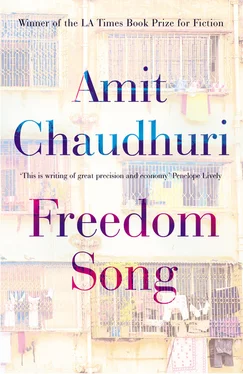Thereafter, on failing her BA, she, who had little interest in books, would devote her sporadic but avid reading habits to women’s magazines, and, as she grew older, to Ramakrishna’s Kathamrita (which her mother once used to read) for its queer parables and homilies; for she often found her mind turning to things that were holy. She had married Bhola solely because her father had decided it should be so; a German-trained engineer counted for a great deal in those days. Bhola’s family were secretly disappointed, although Bhola’s wife came, as it turned out, from a rich business family; but they would have preferred a background with more pedigree, and perhaps a fairer bride. From Assam, Bhola’s elder sister, the one they called Didi, came in a train for the wedding; Khuku came in a plane from Delhi.
During the first two years of his married life, he and his wife quarrelled frequently because they often misunderstood each other. But he had a job that was secure, a furnished flat; he had a good beginning in Calcutta.
It is useless to speculate what his life and the lives of his wife and his children might have been like had he kept his job. But he had left it one day on an impulse, ready to listen to no one else, and they vacated the apartment, and moved to a small flat on Swinhoe Street. From there, later, they went to Fern Road, where, probably, Bhaskar was conceived. Below their flat, two doors away, there was a jeweller’s, with a collapsible gate and a fat man in a dhoti and cap leaning behind a counter. Finally, they came to Vidyasagar Road.
After Bhaskar’s birth (his eyes were so large and dark that they seemed to be outlined with kohl), his mother suffered from a brief but acute spell of depression, such as is common to women after the experience of childbirth. She even wanted to go home; it seemed, strangely, that she could take no more of the marriage. A few days later the depression disappeared and she never spoke of it again.
Such were their lives’ inconsequential beginnings.
And they had social obligations that kept them all occupied early that February. It was a dance with complex steps; they went to a wedding; they had to go to Banidi’s funeral, she who had died unexpectedly; they visited one of Bhola’s friends, whom he’d almost lost touch with; a meeting was arranged with a family in a little flat off Lansdowne Road, to see another ‘girl’ for Bhaskar. Her father was a widower: her mother had died of cancer.
Bhola had decided secretly that he must not dwell on Bhaskar’s politics or even politics at all (a difficult renunciation) during the meeting for the sake of a smooth passage to marriage. Possibly he was going to be a little disingenuous, but a little disingenuousness didn’t count.
Bhaskar would put on some weight after these visits; for he ate whatever was offered to him. It didn’t matter whether he was hungry or not; he believed he should profit in some way from these occasions; it was a habit he’d had since he was a child.
For many days now, Bhola had been trying to arrange another meeting with a ‘party’, but Bhaskar had lapsed easily again into a state of indifference. They showed him photographs; but he was never at home! When they put their questions to him directly he mumbled his replies. It was not that he didn’t care; he was twenty-eight years old; and he experienced an acute absence at times by his side. But it was as if his recent eloquence on politics had left him inarticulate about personal matters; and he had a profound fear that he would not find a bride to his liking. Which girl would marry someone who did not have a well-settled job with chances of promotion in an established company — at the very least? It was to conceal these fundamental and unspoken doubts that he commanded his parents, ‘Do what you want, then. And don’t wait for my permission. Frankly I have nothing to say on the matter; and when have you listened to me, anyway.’
They had gone to the house in the lane off Lansdowne Road early that month. They consulted a shabby calendar, saw that the date had arrived. Bhaskar hadn’t returned home yet; they panicked briefly. No one remembered, later, how this meeting had been arranged. The door of the flat was open; a corridor led to the sitting-room; here, a neutral pattern of furniture awaited them and Bhaskar and Piyu and their mother seated themselves.
Dr Ghosh sat joyously upon an arm-chair facing them. Without delay, he embarked upon an explanation about how his two children, his daughter, Sandhya, and his son, Bipul (the younger of the two, studying management in South India), had grown up looked after by him, because his wife had died twelve years ago of cancer, as if he was recounting an old instructive parable. Over the last five years, the daughter, he confided, had taken over the household.
‘Coughs and colds and diarrhoea I can take care of,’ he said, ‘but not food.’ He taught medicine in a college.
‘Where is she?’ asked Bhola, smiling.
‘She’s in the kitchen,’ said the doctor, too young at fifty to be bereft of a wife, ‘making tea. She’ll be here in a minute.’
‘And what does she do?’ asked someone.
‘She’s doing an MA in sociology, but she’s an interior decorator as well. . That, I would say’—he smiled—‘is her first love. Everything in this house was decorated by her. .’ They looked around them with awe at the prints on the walls, the lampshades, and the decorations: wooden Kashmiri miniatures, a picture of a yak and a Tibetan herdsman done with coloured threads.
‘It’s very quiet here,’ said Bhola, ‘in spite of being so near the main road! You’re lucky to have a flat here, Mr Ghosh.’ This congratulatory observation mildly embellished the air of what was a modest but neat flat with breezes circulating in it.
Sandhya came out from the kitchen with a tray full of tea-cups and five plates of sweets; they sat up as if they’d been ordered to, and Dr Ghosh said, ‘No, you must have something.’ She had a peaceful face; she was dark, and wore glasses. No one could decipher from her serenity that she had already seen in the same capacity a cost accountant, a marine engineer, and a lecturer, and been seen; today she had been informed she was to see a businessman’s son. No, she was, admittedly, not particularly beautiful, but youth — she was twenty-four — has its own beauty wherever it resides, like a rare flower in a wilderness even in a city as large as Calcutta, an apparition before its bloom fades. Everyone was made speechless by her and Bhaskar glanced at her quickly. They were filled with wonder for a stranger.
‘You must have one,’ said Dr Ghosh to Piyu. ‘What’s your name? A very pretty girl. .’
‘Say something,’ said her mother.
All her life, except between the age of one and five, when she had been garrulous, albeit with a limited and repetitive vocabulary, Piyu had found talking difficult before strangers, as if she was hiding the best for another encounter, or person.
‘Piyali,’ she said at last, after a long time.
‘We call her Piyu,’ said her mother, as if by imparting this fact she had sealed a special pact between them.
‘Tea?’ asked Sandhya suddenly.
So easily these crucial meetings could lapse unobtrusively into boredom! — but this did not happen now. Once Sandhya had poured tea, they considered the sweets and weighed them figuratively. ‘The size of these langchaas. .’ said Bhaskar’s mother. Bhaskar said nothing. ‘They’re fresh,’ said Dr Ghosh, as if he were speaking of children he had delivered. ‘They come to the sweet-shop every evening — I went and bought them an hour ago.’ As they ate, he, without undue emphasis, began to ask after Bhola’s company. ‘We manufacture cranes,’ said Bhola, ‘and other kinds of engineering implements.’ Bhaskar opened his mouth once or twice, cleared his throat — and said nothing. He put a roshogolla whole in his mouth.
Читать дальше












